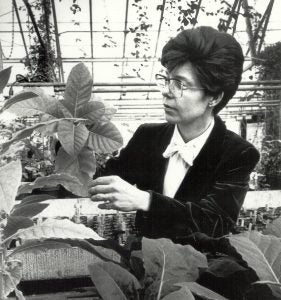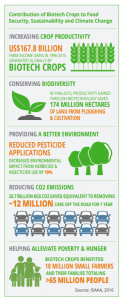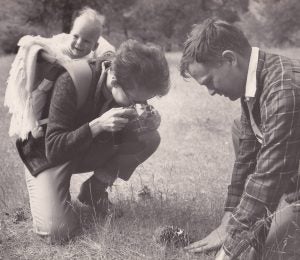In a world where a majority of people can name all of the Kardashian sisters but have never heard of Dr. Norman Borlaug or Dr. Mary-Dell Chilton, it’s been nice to see the rise of popular social media tags like #ScientistsArePeople and #ActualLivingScientist or #ActualLivingFarmer.
Today, it seems as though more and more people are concerned with what they’re eating, but, unfortunately, scientists and farmers seem to take a back seat to huge food corporations and their marketing tactics. Everywhere you look there is a new label popping up in attempts to sell you something while misinformation runs rampant on the internet.
It is here where it’s important to learn the science and go directly to the source — the scientist. One of the most unappreciated careers out there, in my opinion. Dr Norman Borlaug has been called “The father of the green revolution” and is credited with saving a billion lives. He was awarded the Nobel Peace Prize, Congressional Gold Medal, the Presidential Medal of Freedom, and the World Food Prize, just to name a few. He is famous for developing better and higher-yielding strains of wheat in the 1970s, but this was before GMO (transgenic) crop breeding came into play.

And this is where Mary-Dell Chilton comes in. In the late ’70s and early ’80s Chilton was inspired by nature to transfer a naturally occurring agrobacterium into the gene of a tobacco plant. She led a collaborative research study at Washington University in St. Louis, and although GMO tobacco was never commercialized, it was here to where she learned they could do it.
In 1983, she was offered a job at CIBA-Geigy (now Syngenta) and developed the first GMO, or transgenic, cotton, corn, and other crops. I highly recommend watching an interview with her here in which she discusses the differences in plant breeding. Every plant that we eat has been modified by humans — every single one — but now, scientists can choose specifically what gene to modify. Traditional crossbreeding means randomly scrambling thousands of genes and hoping for the desired outcome. Mutagenesis is used in organic plant breeding, which submerges plants in chemicals and blasts them with gamma radiation to hopefully get the desired outcome. This has created crops like organic ruby red grapefruits. Sound scary? It really isn’t once you understand the science. In her interview, she says, “Crossbreeding changed genes you didn’t mean to. In a real sense, the process they’ve used for genetically engineering a crop plant (GMO) is a natural one. We learn it from nature. We learn it from agrobacterium. Nature did this before we ever discovered it. All we did was learn how agrobacterium manages to put a gene into a plant and we copied that process.”
As scientists and farmers whose voices are easily drowned out by bad science and misinformed activists who’ve never stepped foot on a farm or in a lab, it is important to gather the #FactsNotFear from places of sound science and not marketing ploys from food companies. Fear sells, and marketers know it. Science is hard, but it’s such a critical role in feeding an upcoming population of 9 billion people, while using fewer resources and conserving our cropland for the future. While misinformed activists yell “Monsanto Monsanto GMO something something Monsanto,” farmers and scientists are left shaking our heads, wondering where people come up with this stuff. They instantly lose credibility and show their lack of knowledge when it was Syngenta that invented GMOs and farmers have hundreds of seed companies to choose from and thousands of varieties. GMO crops do exactly what humans have been doing to plants for thousands of years, just now it is less invasive and more precise, giving farmers a better product that’s good for us and the planet.

Fast-forward to today, the 78-year-old Chilton is considered “The Mother of Genetic Modification,” (AKA the Mother of Modern Ag), is a national academy of inventors fellow, winner of the 2013 World Food Prize, is considered the Queen of Agrobacterium, inducted into the National Inventors Hall of Fame, and continues to serve as the principal scientist at Syngenta. In 2002, she received the Benjamin Franklin Medal from the Franklin Institute in Philadelphia, joining a roster of winners including Thomas Edison, Albert Einstein, Alexander Graham Bell, and Steven Hawking.
The development of her crops benefit farmers and the environment and are now grown on over 185 million hectares.

Michelle Miller, the Farm Babe, is an Iowa-based farmer, public speaker and writer, who lives and works with her boyfriend on their farm which consists of row crops, beef cattle, and sheep. She believes education is key in bridging the gap between farmers and consumers.



